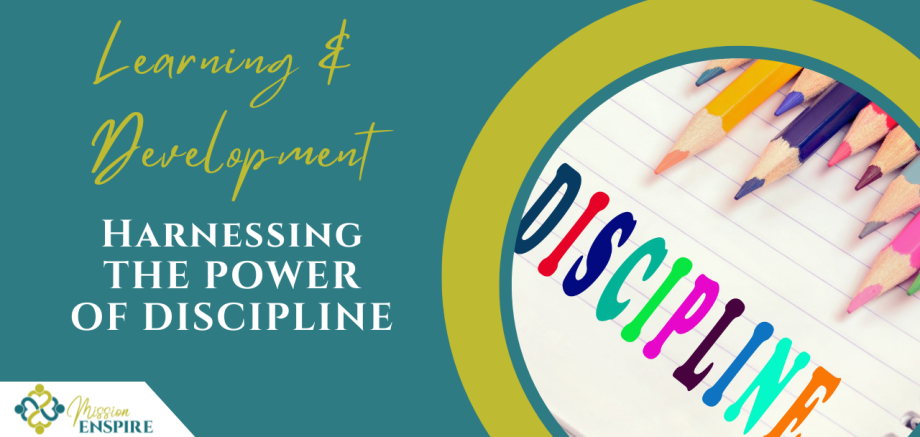Can you believe that it’s the second week of October already? For me, at least, this is the point in the year where the remaining weeks really start to fly by! (Does anyone else feel the holiday season and December 31st looming just around the corner?) But there’s still time to make the most of 2023 and with October being National Learning and Development Month–and following September’s Self-Improvement Month–I thought this month was the perfect time to dive deeper on lifelong learning and personal and professional development.
This week and next, I’m focusing on the topic of discipline: how we can develop it and how we can use it to our advantage in our learning and development journey. Many of us might have an initial gut reaction to the term “discipline” that isn’t the most positive: perhaps we had childhood experiences that cause us to associate discipline with punishment; or even if we think of discipline as being more along the lines of self-discipline, it’s also common to think that self-discipline revolves around rule-following, working, or denying yourself treats or other indulgences. But productive, meaningful discipline shouldn’t be punitive, and it doesn’t have to be a chore. Instead, we can harness the power of discipline for our learning and development.
Benefits of Self-Discipline
When you develop self-discipline, you have many beneficial results. These include a sense of accomplishment, more self-respect, and a better understanding of what you can do. Discipline is not always easy, but it is well worth it. When you set goals and work on them every day until you accomplish the goal, you feel proud of yourself. Not only because you accomplished the goal, but because you did not quit. You stuck with your goals and made them happen. Think back to when you had a goal and worked on it every day until it was done. How did you feel?
When you discipline yourself to accomplish a goal, you also increase your self-respect. Think of the people you have the most respect for, and why you respect them. Chances are one of those reasons is that they have self-discipline. They set out to do something and they accomplish it. By doing the same for yourself, you can have more respect for who you are as a person. You learn more of what you can do. When you set goals and challenge yourself to meet them, you will find out that you can overcome obstacles that you might have thought were too difficult. You learn more about who you are and what you can accomplish when you set your mind to it.
Many times, we put limitations on ourselves that aren’t really accurate. In the coaching world, we sometimes call this phenomenon “limiting beliefs” and they can pertain to topics large or small, specific or wide-ranging. “I’m not athletic, I could never run a 5K race (or a half-marathon, marathon, etc)”; “I’m too old (or too young) to do ____”; “I’m not creative enough to be an entrepreneur”; “I’ll never get ahead in life” are all examples of limiting beliefs that can hold us back. These beliefs can be shaped by a whole host of deep-seated factors, sometimes going as far back as our childhood. Many of us have limiting beliefs that were influenced by the habits, mindset, or circumstances of our parents or our extended community–perhaps without us even being consciously aware of it at the time. Or negative experiences in school or the workplace might have shaken our confidence and caused self-doubt to take root in our minds. Limiting beliefs can be powerful, pervasive, and persistent.
Think about something you think is not possible. Is it really impossible or are you setting a limitation that is artificial? One way to find out is to set a goal and make it happen. Obviously, some goals won’t happen overnight. Progress might be slow and gradual, depending on your starting point, the magnitude of your goal, and the distance between those start and finish lines. (If you’re really feeling bogged down by your limiting beliefs and need some extra support, a skilled coach can be a great resource for helping you get “unstuck” and chart a new path forward.)
You can use this mindset to practice embracing some of the benefits of discipline. Figure out a goal that you want to do and set up milestones along the way. Then each day do something to make those milestones happen. It doesn’t have to be anything major, just one more small step on the way to your final goal. When you reach that final goal, take stock of how you feel about yourself and what you are capable of doing. (For much more on goal setting, see my April 2023 blog series.)
Discipline in Bite Sized Steps
But what are some ways to begin practicing self-discipline that are manageable, achievable and don’t reinforce those negative perceptions of discipline as being too limiting and deprivation-focused? One of the ways that people struggle with developing self-discipline, is trying to make too many changes at once–not just by doing more than one goal at a time, but by making those goals way too large. Either of these approaches can lead to us feeling deprived, discouraged, and ultimately demotivated.
An example of too many goals at once might be someone choosing to quit smoking, improve their eating habits, exercise regularly, build a successful business, and get out of debt, all at the same time. All of these goals are common things that many people strive to achieve and that can be beneficial for our longer-term health, wealth, and quality of life. But if you try to do them all at once, though, you will probably find it to be too much and quit. This is one of the reasons why some of those big, bold New Year’s resolutions that we make every January 1 tend to fizzle out as the year goes on. Instead, focus on one or two of your goals for the first several months, to give yourself time to make new habits, notch some small “wins” to celebrate, and use that momentum to move on to other goals.
For example, if your most urgent goal is to quit smoking because you’re concerned about the long-term health effects and the day-to-day impact on your budget, you might start by focusing just on that goal. You could spend a couple of months getting rid of the cigarettes and using aids like the nicotine patch to help. Then once you feel that you’ve reached a place of stability and confidence in meeting that goal, you can move on to tackle others.
You may find changing your diet and exercising more to be really overwhelming goals because they are huge ones–and so generic that it can be difficult to pinpoint where to start. So, another tactic to help you with discipline is to break them down into smaller goals. If you look across your food and drink consumption and decide that you want to focus on cutting out soda, for example, maybe you break it down into this week you cut your soda intake in half, then week two you cut it out completely. If you do this week by week making one small change, you may find it easier to stay in control.
Another way you can break it down is by intensity. So, say you want to exercise more, but you have not exercised in years. If you start with something like a full workout, you may give up or get injured and then be unable to exercise at all. So instead of going full tilt, you can start by doing mini workouts at a lower intensity for a few days, and over time add more minutes to your workout until you reach at least 20 to 30 minutes of activity. You can also over time increase the intensity of your workout as you get stronger and in better shape. By breaking down the goals into bite-sized steps, you can make it easier to develop the discipline you need to accomplish them. You will also improve the chances of success in changing your habits.
Self-discipline doesn’t have to be a practice that we dread or fear! When we start to see discipline not as something that’s imposed on us but as a tool that we are in control of, we can use it to further our personal and professional development goals. Next week, I’ll share more tips about how to practice discipline in a healthy and effective way, and in the meantime, feel free to share any examples of a time when you broke discipline down into some bite-sized steps!

